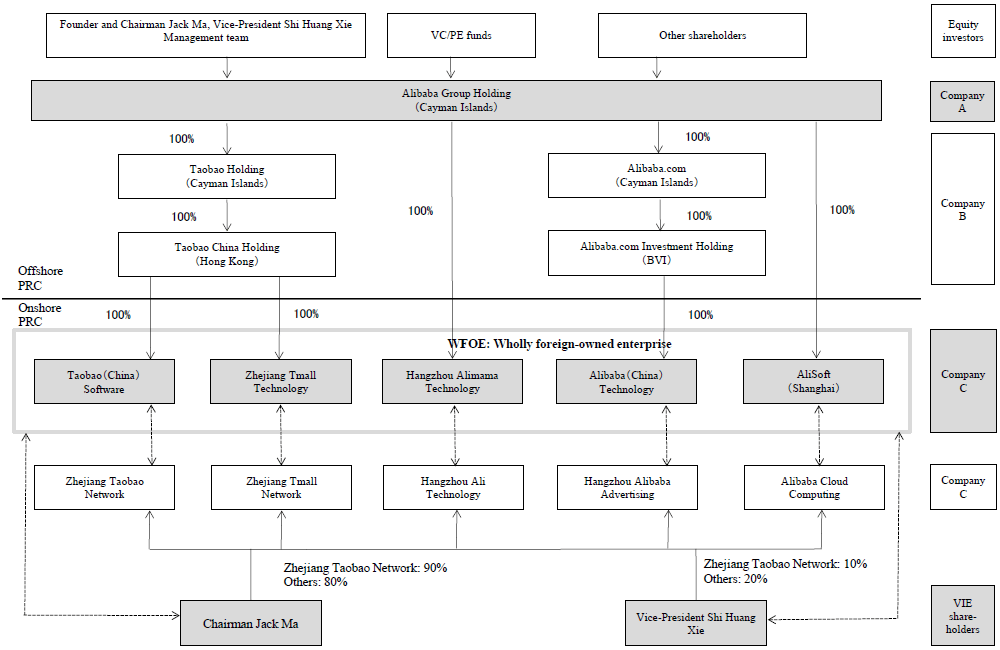

Similar to Ma, Peng began her career as a teacher at the Zhejiang University of Finance and Economics.

Today Tsai is the Vice Executive Chairman and co-founder of Alibaba Group and ranks as its second-largest individual shareholder after chairman Jack Ma. Deeply inspired by Jack’s charisma and his idea for Alibaba, he made a daring move to give up his high-end job to join Alibaba in 1999 and earned only US$50 monthly. Prior to meeting Ma, Tsai was an investment banker earning approximately US$700k annually. Tsai has an undergraduate degree in Economics and East Asian studies and a law degree. Joseph Tsai – Executive Vice Chairman, Alibaba Group


Later in 1999, Ma started Alibaba Group along with his trusted friends where Jianhang decided to get on board the Alibaba venture. Jin first encountered Ma during an interview with him back when he was with China Yellow Pages. Jin Jianhang was a top performing student from Fudan Journalism School and has worked at numerous Chinese Media such as Zhejiang Daily and Intl. To examine their personal journey and contribution in establishing Alibaba here are their stories. Particularly the diversity of each founders which were a mix of Ma’s ex-students, ex-colleagues, mutual friends and like-minded entrepreneurs from different industries journalism, investment banking, web development and education among many others made all the difference. The 17 co-founders of Alibaba are one of the key driving factors that led to its success. Later, Ma and his 17 colleagues created a bulletin-board service through which Chinese companies could introduce their products to clients calling it .Īlso read: Jack Ma, new retail, and robots: What we saw at Alibaba’s Computing Conference Alibaba Beyond Jack Ma In February 1999, Ma invited his 17 colleagues to his apartment in Hangzhou introducing to them the thought of digital platform which he claimed to “revolutionise the Internet industry”. Struck by how many messages had been scribbled on the stone Ma decided to replicate it on the internet. Unfortunately, Ma was not the only person with this idea of directory service, he soon pulled the plug and moved back to Hangzhou.īefore departing for his hometown, Ma visited the Great Wall with 12 former employees. At that point the Internet had begun to spread in China which quickly grew his venture enough to open an office in Beijing. This led him to thinking that people should know China through the the Internet, founding China Yellow Pages - the first Internet company in the country. His skill came in handy as Ma’s proficiency in English gave him the ticket to go to United States as interpreter for a government project where he had his first encounter with the Internet.Īs Ma explored more and more of the internet he come to realise that the world doesn’t know much of China - even Chinese beer doesn’t exist from the search engines. Later in 1988, he became an English and International Trade lecturer at the Hangzhou Dianzi University while juggling a teaching job at a night school. The company was founded by Chung Tsai and Yun Ma on Jand is headquartered in Hangzhou, China.Following Alibaba’s Story From Jack Ma’s Personal Journeyĭespite the many life challenges Ma faced including two failed attempts to get into college, getting rejected for a job at KFC, Ma successfully earned his degree in English from Hangzhou Teacher’s Institute in 1984. The Cloud segment includes Alibaba Cloud and DingTalk. The Cainiao segment has Cainiao Network and offers domestic and international one-stop-shop logistics services and supply chain management solution. The Local Consumer Services segment is involved in To-Home businesses, which include Ele.me, local services and delivery platform, and Taoxianda, and To-Destination segment businesses which include Amap, the provider of mobile digital map, navigation and real-time traffic information, and restaurant and local services guide platform. The International Commerce segment focuses on international commerce retail and wholesale businesses. The China Commerce segment includes China commerce retail and wholesale businesses. The Core Commerce segment consists of platforms operating in retail and wholesale. It operates through the following business segments: China Commerce, International Commerce, Local Consumer Services, Cainiao, Cloud, Digital Media and Entertainment, and Innovation Initiatives and Others segments. engages in providing technology infrastructure and marketing reach.


 0 kommentar(er)
0 kommentar(er)
